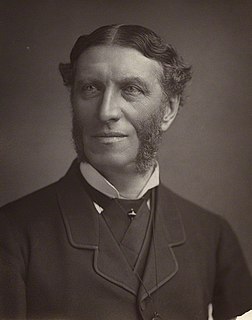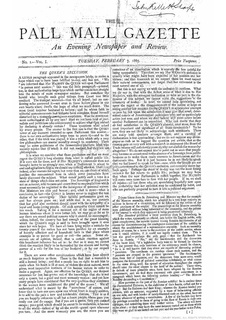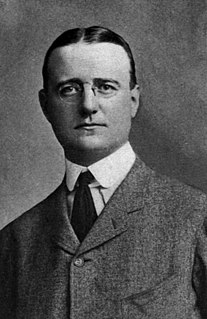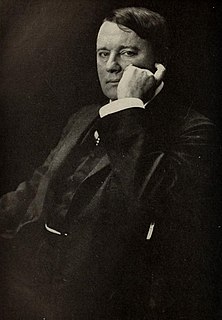Related Research Articles

Matthew Arnold was an English poet and cultural critic who worked as an inspector of schools. He was the son of Thomas Arnold, the celebrated headmaster of Rugby School, and brother to both Tom Arnold, literary professor, and William Delafield Arnold, novelist and colonial administrator. Matthew Arnold has been characterised as a sage writer, a type of writer who chastises and instructs the reader on contemporary social issues. He was also an inspector of schools for thirty-five years, and supported the concept of state-regulated secondary education.

The muckrakers were reform-minded journalists, writers, and photographers in the Progressive Era in the United States (1890s–1920s) who claimed to expose corruption and wrongdoing in established institutions, often through sensationalist publications. The modern term generally references investigative journalism or watchdog journalism; investigative journalists in the US are occasionally called "muckrakers" informally.
Investigative journalism is a form of journalism in which reporters deeply investigate a single topic of interest, such as serious crimes, political corruption, or corporate wrongdoing. An investigative journalist may spend months or years researching and preparing a report. Practitioners sometimes use the terms "watchdog reporting" or "accountability reporting."

William Thomas Stead was a British newspaper editor who, as a pioneer of investigative journalism, became a controversial figure of the Victorian era. Stead published a series of hugely influential campaigns whilst editor of The Pall Mall Gazette, and he is best known for his 1885 series of articles, The Maiden Tribute of Modern Babylon. These were written in support of a bill, later dubbed the "Stead Act", that raised the age of consent from 13 to 16.

The Pall Mall Gazette was an evening newspaper founded in London on 7 February 1865 by George Murray Smith; its first editor was Frederick Greenwood. In 1921, The Globe merged into The Pall Mall Gazette, which itself was absorbed into The Evening Standard in 1923.
New Journalism is a style of news writing and journalism, developed in the 1960s and 1970s, that uses literary techniques unconventional at the time. It is characterized by a subjective perspective, a literary style reminiscent of long-form non-fiction. Using extensive imagery, reporters interpolate subjective language within facts whilst immersing themselves in the stories as they reported and wrote them. In traditional journalism, however, the journalist is "invisible"; facts are reported objectively.

Finley Peter Dunne was an American humorist, journalist and writer from Chicago. In 1898 Dunne published Mr. Dooley in Peace and in War, a collection of his nationally syndicated Mr. Dooley sketches. Speaking with the thick verbiage and accent of an Irish immigrant from County Roscommon, the fictional Mr. Dooley expounded upon political and social issues of the day from his South Side Chicago Irish pub. Dunne's sly humor and political acumen won the support of President Theodore Roosevelt, a frequent target of Mr. Dooley's barbs. Dunne's sketches became so popular and such a litmus test of public opinion that they were read each week at White House cabinet meetings.

James Louis Garvin CH was a British journalist, editor, and author. In 1908, Garvin agreed to take over the editorship of the Sunday newspaper The Observer, revolutionising Sunday journalism and restoring the paper, which was facing financial troubles at the time, to profitability in the process.

The Criminal Law Amendment Act 1885, or "An Act to make further provision for the Protection of Women and Girls, the suppression of brothels, and other purposes," was an Act of the Parliament of the United Kingdom, the latest in a 25-year series of legislation in the United Kingdom of Great Britain and Ireland beginning with the Offences against the Person Act 1861. It raised the age of consent from 13 years of age to 16 years of age and delineated the penalties for sexual offences against women and minors. It also strengthened existing legislation against prostitution and homosexuality. This act was also notable for the circumstances of its passage in Parliament.
The Eliza Armstrong case was a major scandal in the United Kingdom involving a child supposedly bought for prostitution for the purpose of exposing the evils of white slavery. While it achieved its purpose of helping to enable the passage of the Criminal Law Amendment Act 1885, it also brought unintended consequences to its chief perpetrator, W. T. Stead.

The Review of Reviews was a noted family of monthly journals founded in 1890–1893 by British reform journalist William Thomas Stead (1849–1912). Established across three continents in London (1891), New York (1892) and Melbourne (1893), the Review of Reviews, American Review of Reviews and Australasian Review of Reviews represented Stead's dream of a global publishing empire.

Journalism in the United States began as a "humble" affair and became a political force in the campaign for American independence. Following independence, the first amendment to the U.S. Constitution guaranteed freedom of the press and freedom of speech. The American press grew rapidly following the American Revolution. The press became a key support element to the country's political parties, but also for organized religious institutions.

"The Maiden Tribute of Modern Babylon" was a series of highly controversial newspaper articles on child prostitution that appeared in The Pall Mall Gazette in July 1885.
Rebecca Jarrett (1846–1928) was a former English prostitute and procuress who, with reformer and newspaper editor William Thomas Stead, fought against child prostitution and white slavery during the late 19th century.

Alfred Charles William Harmsworth, 1st Viscount Northcliffe, was a British newspaper and publishing magnate. As owner of the Daily Mail and the Daily Mirror, he was an early developer of popular journalism, and he exercised vast influence over British popular opinion during the Edwardian era. Lord Beaverbrook said he was "the greatest figure who ever strode down Fleet Street." About the beginning of the 20th century there were increasing attempts to develop popular journalism intended for the working class and tending to emphasize sensational topics. Harmsworth was the main innovator.

Benjamin Scott, FRAS served as the Chamberlain of London from 1858 until his death. As well as an enduring figure in the life of the city, he was also a committed social activist of the age, collaborating with noteworthy people such as Josephine Butler and W. T. Stead.
The history of journalism in the United Kingdom includes the gathering and transmitting of news, spans the growth of technology and trade, marked by the advent of specialised techniques for gathering and disseminating information on a regular basis. In the analysis of historians, it involves the steady increase of the scope of news available to us and the speed with which it is transmitted.
James Nicol Dunn was a Scottish journalist and newspaper editor, best known as the editor of London newspaper The Morning Post from 1897 to 1905 and as London editor of the Glasgow Evening News from 1914 unitl his death in 1919.

The Minotaur is an 1885 painting by the English painter George Frederic Watts. It depicts the Minotaur from Greek mythology as he waits for his young sacrificial victims to arrive by ship. It is an allegorical comment to child prostitution, an issue brought to attention by W. T. Stead in 1885. The painting has been in the collection of Tate Britain since 1897.
The British Weekly: A Journal of Social and Christian Progress was a significant publication from its founding in 1886 well into the 20th century. One of the most successful religious newspapers of its time, it was published by Hodder & Stoughton. It was "a central force in shaping and promoting the 'Nonconformist conscience'", according to the Dictionary of Nineteenth-century Journalism in Great Britain and Ireland.
References
- ↑ Baylen, J.O. (December 1972). "The 'New Journalism' in Late Victorian Britain". Australian Journal of Politics & History. 18 (3): 367–385. doi:10.1111/j.1467-8497.1972.tb00602.x.
- ↑ Soderlund, Gretchen (Jun 3, 2013). Sex Trafficking, Scandal, and the Transformation of Journalism, 1885-1917. University of Chicago Press. ISBN 9780226021676.
Stead had always been attracted to the idea of the journalist as preacher, but while serving his sentence in Holloway Prison, he began to think about the idea of the journalist as ruler.
- ↑ Stead, William (1886). "Government by Journalism". The Contemporary Review .
The very conception of journalism as an instrument of government is foreign to the mind of most journalists. Yet, if they could but think of it, the editorial pen is a sceptre of power, compared with which the sceptre of many a monarch is but a gilded lath.
- ↑ Bennett, David (Dec 1, 2003). The General: William Booth, Volume 2. Xulon Press. ISBN 978-1287730040.
- ↑ Eckley, Grace (Mar 8, 2007). Maiden Tribute: A Life of W.T. Stead. Xlibris Corporation. ISBN 978-1425727086.
- ↑ Stead, William (1908). "Lord Cromer and Government by Journalism". The Contemporary Review .
- ↑ Robinson, W. Sydney (May 12, 2012). Muckraker: The Scandalous Life and Times of W. T. Stead, Britain's First Investigative Journalist. Biteback Publishing. ISBN 978-1849545853.
- ↑ Pearce, Jenny (Sep 10, 2009). Young People and Sexual Exploitation: 'It's Not Hidden, You Just Aren't Looking'. Routledge. ISBN 978-0415407168.
...contributed to the drive for changes within The Criminal Law amendment Act of 1885, commonly known as Stead's Act...
- ↑ Bell, Ernest (1912). Some Observations in Europe. The Light.
- ↑ Stead, William (1908). "W. Randolf Hearst". The Review of Reviews.
- ↑ "We have had opportunities of observing a new journalism which a clever and energetic man has lately invented. It has much to recommend it; it is full of ability, novelty, variety, sensation, sympathy, generous instincts; its one great fault is that it is feather-brained." Mathew Arnold, The Nineteenth century No. CXXIII. (May 1887) pp. 629–643. Available online at http://www.attackingthedevil.co.uk/related/easter.php
- ↑ Quoted in Harold Begbie, The Life of General William Booth Archived 2012-03-14 at the Wayback Machine , (2 vols., New York, 1920). Available [online]